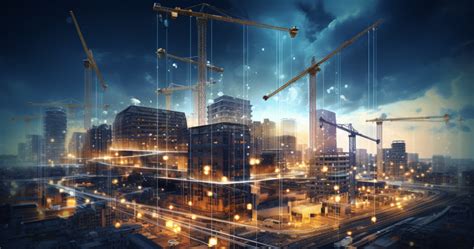The construction industry has witnessed a significant transformation in recent years, driven by technological advancements, changing market demands, and evolving regulatory requirements. As the sector continues to evolve, it's essential to stay ahead of the curve and understand the latest trends shaping the future of construction.

From the integration of artificial intelligence and the Internet of Things (IoT) to the increasing adoption of sustainable building practices, here are seven construction tech trends to watch:
1. Building Information Modelling (BIM)
BIM is a digital representation of a building's physical and functional characteristics. This technology has revolutionized the construction industry by enabling architects, engineers, and contractors to collaborate more effectively and make data-driven decisions. BIM helps to identify potential design and construction issues early on, reducing errors and costs.

With BIM, construction teams can create detailed digital models of buildings, bridges, and other infrastructure projects. This enables them to visualize and analyze the project's design, construction, and operation phases, leading to improved project outcomes.
Benefits of BIM
- Improved collaboration and communication among stakeholders
- Enhanced data accuracy and consistency
- Reduced errors and costs
- Increased efficiency and productivity
- Better decision-making through data-driven insights
2. Artificial Intelligence (AI) and Machine Learning (ML)
AI and ML are transforming the construction industry by automating tasks, improving safety, and enhancing decision-making. AI-powered algorithms can analyze vast amounts of data, identify patterns, and make predictions, enabling construction teams to:
- Optimize project schedules and resource allocation
- Detect potential safety hazards and prevent accidents
- Improve quality control and defect detection
- Enhance customer experience through personalized services

Applications of AI and ML in Construction
- Predictive maintenance and equipment monitoring
- Automated reporting and documentation
- Intelligent site monitoring and surveillance
- Personalized customer service and support
3. Internet of Things (IoT)
The IoT refers to the network of physical devices, vehicles, and other items embedded with sensors, software, and connectivity, allowing them to collect and exchange data. In construction, IoT enables the creation of smart buildings and infrastructure, which can:
- Optimize energy consumption and reduce waste
- Enhance occupant comfort and experience
- Improve safety and security through real-time monitoring
- Enable predictive maintenance and reduce downtime

Benefits of IoT in Construction
- Improved energy efficiency and reduced waste
- Enhanced occupant experience and comfort
- Increased safety and security through real-time monitoring
- Predictive maintenance and reduced downtime
4. Sustainable Building Practices
The construction industry is shifting towards sustainable building practices, driven by growing concerns about climate change, energy efficiency, and environmental sustainability. Sustainable building practices aim to minimize the environmental impact of construction projects, while also improving occupant health and well-being.

Benefits of Sustainable Building Practices
- Reduced environmental impact and carbon footprint
- Improved occupant health and well-being
- Increased energy efficiency and cost savings
- Enhanced brand reputation and social responsibility
5. Modular Construction
Modular construction involves building structures in a factory, using a range of materials and techniques, and then transporting the modules to the construction site for assembly. This approach offers several benefits, including:
- Improved quality and consistency
- Reduced construction time and costs
- Increased safety and reduced waste
- Enhanced flexibility and customization

Benefits of Modular Construction
- Improved quality and consistency
- Reduced construction time and costs
- Increased safety and reduced waste
- Enhanced flexibility and customization
6. Robotics and Automation
Robotics and automation are transforming the construction industry by increasing efficiency, reducing labor costs, and improving safety. Construction robots can perform tasks such as:
- Demolition and debris removal
- Concrete finishing and inspection
- Steel fabrication and assembly
- Painting and coating

Benefits of Robotics and Automation in Construction
- Increased efficiency and productivity
- Reduced labor costs and improved safety
- Enhanced quality and consistency
- Improved data collection and analysis
7. Virtual and Augmented Reality
Virtual and augmented reality technologies are revolutionizing the construction industry by enabling immersive and interactive experiences. These technologies can be used for:
- Design visualization and review
- Construction training and simulation
- Safety training and hazard identification
- Customer experience and engagement

Benefits of Virtual and Augmented Reality in Construction
- Improved design visualization and review
- Enhanced construction training and simulation
- Increased safety and reduced hazards
- Improved customer experience and engagement
In conclusion, these seven construction tech trends are transforming the industry by improving efficiency, reducing costs, and enhancing safety. As technology continues to evolve, it's essential for construction professionals to stay ahead of the curve and adopt innovative solutions that drive business success.






What is the future of construction technology?
+The future of construction technology is expected to be shaped by emerging trends such as artificial intelligence, robotics, and virtual reality. These technologies will continue to transform the industry by improving efficiency, reducing costs, and enhancing safety.
How can construction companies adopt new technologies?
+Construction companies can adopt new technologies by investing in research and development, partnering with technology startups, and providing training and support for employees. They can also start by implementing small-scale pilot projects to test and refine new technologies.
What are the benefits of sustainable building practices?
+The benefits of sustainable building practices include reduced environmental impact, improved occupant health and well-being, increased energy efficiency, and enhanced brand reputation and social responsibility.
